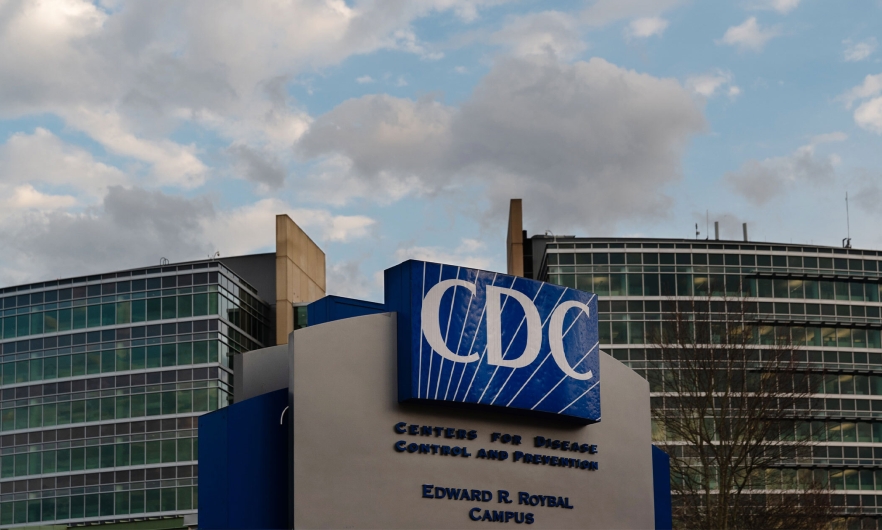Building a Better CDC
A new report says there is no shortcut to restoring public confidence.

Elijah Nouvelage/Bloomberg via Getty Images
As COVID-19 swept across the U.S., a panicked public turned its eyes to the CDC and other health agencies for answers. When none came and the pandemic dragged on and thousands fell ill, faith in their authority and decision making began to plummet.
Now, as COVID becomes part of daily life, those organizations look to regain footing with a wary, distrusting nation. A new report, “Building the CDC the Country Needs,” from the Center for Strategic and International Studies (CSIS) offers guidance for rebuilding the agency’s image, under the knowledge that the power to reset CDC, lies outside of CDC.
Public Health On Call
This article was adapted from the April 5 episode of Public Health On Call Podcast.
In this Q&A, adapted from the April 5 episode of Public Health On Call, Stephanie Desmon speaks to Tom Inglesby, MD, director of the Johns Hopkins Center for Health Security, and J. Stephen Morrison, PhD, a global health policy expert at the CSIS, about their recommendations for how to return trust and confidence to the nation's top public health agency.
Why was this report needed?
JSM: The CDC is in peril, and we need to look at it seriously because the U.S. needs a well-functioning, high-performing public health agency to protect all Americans. We're not getting that.
We looked at data, budgets, culture, guidance, and communications. We asked, “How well does this entity navigate the halls of power? How well does it communicate with the American people? How well does it engage Congress? And is its mission clear?”
What were the main points in the report?
TI: Our recommendations broke down into three big categories: Clarify CDC’s domestic and international mission and integrate it with other agencies doing preparedness work; increase leadership and accountability at CDC; and improve CDC’s operational capability.
We need to make sure that Congress, the public, other agencies of government, state and local partners, and the private sector really understand what CDC does, what its responsibilities are, and what other government agencies or other entities beyond the federal government are responsible for doing.
For example, we all know that CDC is the nation's premier public health agency in terms of responding to large outbreaks and providing the best possible scientific guidance. It also provides technical assistance and grant support to states. But it doesn’t workwith companies to make a diagnostic test—other parts of the government do that. It doesn’t do basic research to understand something at the molecular level—that's more along the lines of what NIH does. It's important to clarify where CDC’s role is singular and extraordinary and to make sure people know CDC is not responsible for things that they can't control.
What part does the international public health work of CDC play in this report?
JSM: CDC’s global mission is an important instrument of foreign policy in advancing global HIV efforts. It was important with smallpox eradication, and it's important today in building capacity in global health security.
But it gets overlooked, [even though] it accounts for about a quarter of the budget when you factor in the HIV and PEPFAR monies that go through it. And it accounts for about 1,800 employees. For the future, we have got to play a role as a leader in building capacity for preparedness and response. We must integrate it, acknowledge it, elevate it, and give it stronger leadership.
We've already seen this logic in action. Dr. Walensky announced two weeks ago the appointment of Howard Zucker, former New York state health commissioner,as the new deputy director for CDC responsible for the global mission. It’s a very welcome move that’s long overdue.
The CDC was once extremely highly respected and trusted, and that has plummeted in the last several years. Why? And how do we dig out of this hole?
TI: The public sentiments around CDC have fallen substantially over the last couple of years across all groups. It is really important to restore trust in CDC, because future emergencies will require that people have confidence in CDC and the government in order to take actions to diminish the impact of future crises.
The CDC used to enjoy among the highest favorability ratings of the federal agencies. Our view coming out of this report is that there's no real shortcut to getting back to that. Good, strong capability and the demonstrated capacity to respond to new emergencies, outbreaks, and crises, is what is going to turn things around. It's also really important for CDC to be on the top of its game in terms of communications. It sometimes hides its successes, and they could do better at explaining new things like the new Center for Forecasting and Outbreak Analytics or the new way it's reporting on information in the middle of outbreaks that we saw during mpox, for example.
They had real troubles with diagnostic testing at the start [of the COVID pandemic]. Many of the things they had to do were controversial. They had to issue guidance on difficult societal issues around masks, vaccines, and schools—which were upsetting for a lot of the country. Thinking about who to include as they develop new guidance and how to share that guidance development process with congressional leaders, that is all part of restoring Congress’ and the American people’s trust in CDC.
Partisanship feels like it's at an all-time high. What is possible in this environment?
JSM: We have to continue to press forward with common sense, actionable, pragmatic measures that will benefit all Americans, and try to move beyond the anger and toxicity. There's enormous anger and frustration out there being vented against CDC, FDA, and state and local authorities in the aftermath of this pandemic.
The sharp drop in public trust and confidence is a phenomenon we're seeing with public health institutions in the U.S. and globally. There has to be a strategy of patient, pragmatic engagement. We have to listen to people, we have to talk to people. There are calls for greater transparency, greater speed, greater accountability, greater equity. Those are totally legitimate.
These public health decisions had hugely disruptive impacts on people's lives, employment, income, the learning of their children, all of these things. Oftentimes, they were done in a way that was not well-explained, with little consultation. This wasn't just a clash of science with emotion and politics. This was a pandemic that overran our institutions, in which decisions made on public health grounds had huge societal impacts. We're just learning now how to unwind some of the consequences of that.
What needs to be done immediately to prepare for the next pandemic?
TI: CDC is going to need to get better access to data from across the country to be able to do what Congress, the White House, and the public expect them to do—which is to be able to provide a rapid picture of what's going on every day. They're also going to need much more budget flexibility. They need contracting flexibility so they can reach out to the private sector to get things they need in the middle of a crisis. Those are things Congress can do.
JSM: The power to reset CDC lies outside of CDC. The power does not rest in the hands of the CDC director. It lies at the White House, at the Secretary of HHS, and among key Democrats and Republicans in the House and Senate. They need to sit down together and mull over this action plan that we've laid out—and decide how they're going to execute it.
Stephanie Desmon is the co-host of the Public Health On Call podcast. She is the director of public relations and marketing for the Johns Hopkins Center for Communication Programs, the largest center at the Johns Hopkins Bloomberg School of Public Health.




